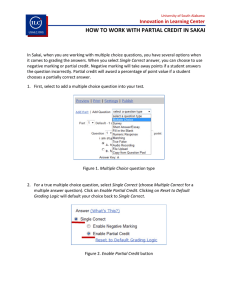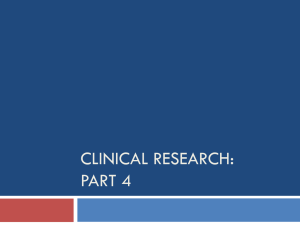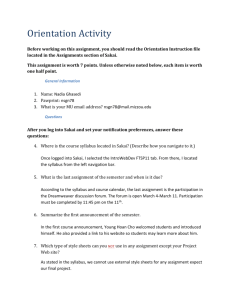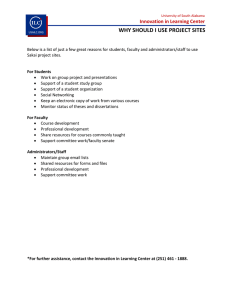College of Public Health and Health Professions Spring 2013
advertisement
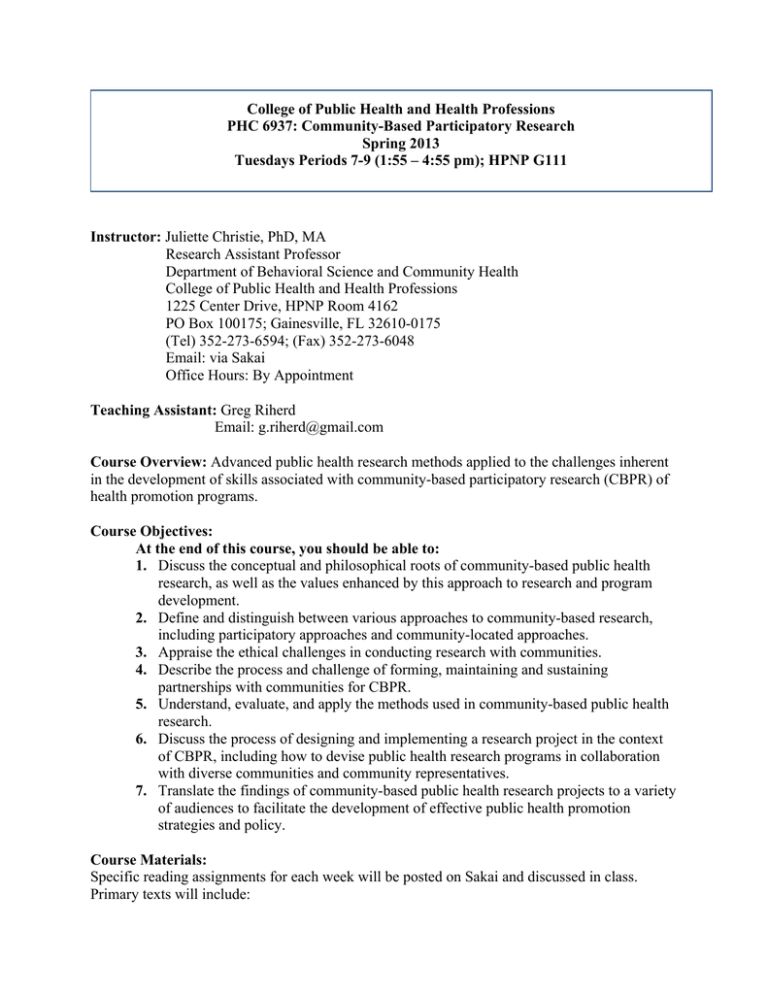
College of Public Health and Health Professions PHC 6937: Community-Based Participatory Research Spring 2013 Tuesdays Periods 7-9 (1:55 – 4:55 pm); HPNP G111 Instructor: Juliette Christie, PhD, MA Research Assistant Professor Department of Behavioral Science and Community Health College of Public Health and Health Professions 1225 Center Drive, HPNP Room 4162 PO Box 100175; Gainesville, FL 32610-0175 (Tel) 352-273-6594; (Fax) 352-273-6048 Email: via Sakai Office Hours: By Appointment Teaching Assistant: Greg Riherd Email: g.riherd@gmail.com Course Overview: Advanced public health research methods applied to the challenges inherent in the development of skills associated with community-based participatory research (CBPR) of health promotion programs. Course Objectives: At the end of this course, you should be able to: 1. Discuss the conceptual and philosophical roots of community-based public health research, as well as the values enhanced by this approach to research and program development. 2. Define and distinguish between various approaches to community-based research, including participatory approaches and community-located approaches. 3. Appraise the ethical challenges in conducting research with communities. 4. Describe the process and challenge of forming, maintaining and sustaining partnerships with communities for CBPR. 5. Understand, evaluate, and apply the methods used in community-based public health research. 6. Discuss the process of designing and implementing a research project in the context of CBPR, including how to devise public health research programs in collaboration with diverse communities and community representatives. 7. Translate the findings of community-based public health research projects to a variety of audiences to facilitate the development of effective public health promotion strategies and policy. Course Materials: Specific reading assignments for each week will be posted on Sakai and discussed in class. Primary texts will include: Isreal, B.A., Eng, E., Schulz, A. J., & Parker, E. A. (eds.). (2005). Methods in community-based participatory research for health. San Francisco, CA: Jossey-Bass. Additional readings will be taken from the current peer-reviewed journals from throughout the field of public health and be made available on Sakai. Course Requirements/Evaluation/Grading: Assignments: Reviewer Critiques via Sakai Discussion Board (5 points each; 25 points total; 25% of your course grade): During the course of the semester and starting on the third week of class, each student is tasked with choosing 5 assigned articles and writing a critique of for each article (see criteria and reviewer critique outline on Sakai). For each critique, students will take the role of a peer-referee and provide a scholarly critique of the assigned article. Reviewer critiques are due by 8:00 p.m. the night before the assigned article will be discussed in class and should be posted on the Sakai discussion board. NOTE: See document on Sakai outlining what constitutes a scholarly critique, which extends beyond a summary of the article. Articles and more information regarding assignment expectations and grading criteria will be provided on Sakai. Critiques should be 1-2 single-spaced page(s). At the top of your critique in your discussion post, please indicate your name, the critique # (e.g., 1, 2), and the article you have chosen to review. Academic Integrity is a serious issue at UF and plagiarism detection software will be used to identify similarity between your work and outside sources. See the section on Academic Integrity for more information. (CO 1-5) Lead Author Presentation (20 points; 20% of your course grade): Each student will be assigned one article for which s/he will take the role of lead author. In this capacity, the student will lead the class in a review and brief discussion (Q&A) of the assigned article in his/her choice format. All presentations must be 12-15 minutes, with an additional 5-10 minutes designated for a question and answer session. Additional guidelines, expectations, and grading criteria will be posted on Sakai. (CO 1-5) Group Project (GP) Tasks and Final GP (20 points; 20% of your course grade): To gain experience using CBPR methods, students will work with the Rural South Public Health Center (RSPHTC) on a collaborative project between UF’s College of Public Health and Health Professions and the Florida Agricultural and Mechanical University (FAMU) Institute of Public Health to address advanced training needs of current public health workers. Specifically, we will focus on assessing the HIV/AIDS needs of medically underserved areas in the state by carrying out a community-based project in collaboration with state and community partners. A detailed presentation of this collaborative initiative and your role in the project will be provided the second week of classes. Your GP grade will consist of 8 GP tasks and an overall assessment of the quality of your final project. (CO 3-6) GP Presentation (25 points; 25% of your course grade): As part of your group project, you will present your group project to the RSPHTC Management Team and community partners/members. More details regarding presentation content and grading criteria will be provided on Sakai. (CO 6-7) Class Participation (10 points; 10% of your course grade): Students are expected to attend and participate actively in all scheduled class meetings in order to obtain the full value of this course. Attendance will not be taken; however, written opportunities to demonstrate class participation (in addition to verbal) will be given to students who are present for class and who thoughtfully participate on randomly selected dates. Typically, participation credit will be based on “minute responses” or student participation in class lecture, discussions, and/or activities. Minute responses are 1-2 minute student responses to (a[n]) instructor- or studentposed question(s) related to course content. Students are expected to provide well-crafted and thoughtful responses on paper and to submit responses at the end of the class meeting. Full credit for class participation will be based on the quality of the response provided or participation displayed. (CO 1-6) E-Learning/Sakai: An E-Learning site in Sakai will be available for the course containing grades, discussion boards, and other information. E-learning is accessible at lss.at.ufl.edu or my.ufl.edu. You must have a valid Gatorlink ID and password. For assistance, call the UF Help Desk at 392-HELP Questions about course material should be posted on the course discussion boards in Sakai. Questions of a personal nature (grades, etc.) should be sent via email or discussed in person. Additional Course Materials and Grade Updates: All course material, including supplemental readings; additional information on assignments and grading rubrics; and grade updates will be available on Sakai (the University of Florida’s e-Learning site). NOTE. The information posted on Sakai is not meant to replace the content of the live course; the information is merely provided to supplement student learning. Class announcements and related postings will be made regularly regarding course content and in-class activities. As such, students are expected to check Sakai before each class meeting and bring (paper or electronic) all necessary materials to class as directed. This is a mandatory course requirement. Keep in mind that all supplemental material, including readings, is included to enhance student learning and understanding of course material. Students are welcome to communicate with each other via posts on the discussion board. In fact, discussions with peers of course material is encouraged and often helpful on many levels. Should you wish to communicate via Sakai, please do so professionally and respectfully—as is expected in the classroom. Please keep in mind, however, that the instructor will not monitor the discussion board. If you have a specific question, please contact the instructor via email on Sakai. Your final grade in this course will consist of the following: 1. 5 Reviewer Critiques Posted on Sakai Discussion Board 2. Lead Author Presentation 3. GP Tasks and Final Project 4. GP Presentation 5. Class Participation 25 points 20 points 20 points 25 points 10 points 100 possible points Grading Scale: Total Course Points 92.5-100 89.5-92.4 86.5-89.4 82.5-86.4 79.5-82.4 76.5-79.4 72.5-76.4 69.5-72.4 66.5-69.4 62.5-66.4 59.5-62.4 59.4 and below Percent of Course Points (out of 100%) 93-100% 90-92% 87-89% 83-86% 80-82% 77-79% 73-76% 70-72% 67-69% 63-66% 60-62% Below 60% Letter Grade A AB+ B BC+ C CD+ D DE Grade Point Equivalent 4.0 3.67 3.33 3.0 2.67 2.33 2.0 1.67 1.33 1.0 0.67 0.0 For greater detail on the meaning of letter grades and university policies related to them, see the Registrar’s Grade Policy regulations at: http://catalog.ufl.edu/ugrad/current/regulations/info/grades.aspx Topical Outline* Date Topic(s) 1/8 Introduction to the course Review of syllabus and assignments Sign up for lead author presentations Introduction to group project Part 1: Philosophical and Ethical Foundations of CBPR Theoretical and practice roots of CBPR Defining CBPR Core values and principles 1/15 Review Schedule and Discuss Group Project Details Form groups Review IRB protocol and procedures GP Guest Presentation(s) Project Infrastructure Overview RSPHTC Management Team Findings: Executive Summary Results of Previous Qualitative Data Collection GP Task 1: 1) Draft IRB application 2) Complete Human Subjects CITI Training and send certification to instructor by noon on 1/16. 1/22 Part 2: CBPR: Current Research Findings and Outstanding Needs Theoretical and practice roots (continued) Current practices and lessons learned Varieties of research in communities GP Task 2: 1) Develop focus group questions for group project; 2) Submit to instructor for review 1/29 2/5 2/12 Part 3: Forming, Maintaining, & Sustaining Partnerships Establishing trust Partnership formation Partnership maintenance Lead Author Presentation 1 Lead Author Presentation 2 Part 4: Planning and Conducting Research in context of CBPR Defining research questions Deciding on study design GP Task 3: 1) Review instructor feedback on focus group questions; 2) Develop focus group script and consent form; submit to instructor for review 3) Work on group presentation(s) Part 4: Planning and Conducting Research in context of CBPR (continued) Methodological issues Ethical issues and IRB Competency Training Cultural Communication Competency Working with the LGBT Community GP Task 4 (Independent): Write a 1-page* reflection paper on competency training received, including how you plan to incorporate cultural communication competencies into your professional work and/or research *Single-spaced, Times New Roman font with 1-inch margins 2/19 Part 4: Planning and Conducting Research in context of CBPR (continued) Analysis and interpretation (Guest Speaker) GP Task 5: 1) Review instructor comments on focus group script; 2) Practice group presentations(s) 3) Q&A 2/20 GP Task 6: Present project, focus group script, and focus group questions to CAB/RSPHTC Management Team from 8:30-10:00 a.m. *location TBA NO CLASS; Participant recruitment for focus groups NO CLASS - SPRING BREAK 2/26 3/5 3/12 Part 5: Dissemination and Translation How CBPR assists in translation Evaluation of CBPR THIS WEEK: GP Task 7: Conduct Focus Group(s) 3/19 Part 6: Outcomes of CBPR Effecting social change and public policy Social justice Addressing health disparities THIS WEEK: GP Task 7: Conduct Focus Group(s) 3/26 Part 6: Outcomes of CBPR (continued) Lead Author Presentation 6 Lead Author Presentation 7 GP Task 8: Data Analysis 4/2 Part 7: Next Steps and Future Trends Synthesizing what we know Essential tenants Lead Author Presentation 3 Lead Author Presentation 4 Lead Author Presentation 5 GP Task 8 (continued): Complete Data Analysis & Address Questions/Concerns 4/9 4/16 Finalize projects Practice GP Presentations 4/17 Final Project Presentation to RSPHTC Management Team and Community Partners/Members from 8:30-10:00 a.m. *location TBA 4/23 NO CLASS *subject to change; any and all changes will be posted on Sakai one week before affected schedule. **Yellow-highlighting denotes meeting times outside of general course schedule, excluding focus groups. Academic Integrity: Students are expected to act in accordance with the University of Florida policy on academic integrity (see Student Conduct Code, the Graduate Student Handbook or these web sites for more details: http://www.dso.ufl.edu/sccr/honorcodes/conductcode.php http://www.dso.ufl.edu/studenthandbook/studentrights.php http://gradschool.ufl.edu/students/introduction.html Cheating, lying, misrepresentation, or plagiarism in any form is unacceptable and inexcusable behavior. We, the members of the University of Florida community, pledge to hold ourselves and our peers to the highest standards of honesty and integrity. Attendance and Make-up Work: First, I expect you to attend and to be prepared to participate actively in all class sessions. Should you miss class, you are responsible for contacting another student for all lecture materials, handouts, and announcements made during class. Second, all course assignments are due at the beginning of the designated class period. Personal issues with respect to class attendance or fulfillment of course requirements will be handled on an individual basis. Accommodations for Students with Disabilities: If you require classroom accommodation because of a disability, you must first register with the Dean of Students Office (http://www.dso.ufl.edu/). The Dean of Students Office will provide documentation to you, which you then give to the instructor when requesting accommodation. The College is committed to providing reasonable accommodations to assist students in their coursework. Counseling and Student Health: Students may occasionally have personal issues that arise in the course of pursuing higher education or that may interfere with their academic performance. If you find yourself facing problems affecting your coursework, you are encouraged to talk with an instructor and to seek confidential assistance at the UF Counseling & Wellness Center, 352-3921575. Visit their web site for more information: http://www.counseling.ufl.edu/. The Student Health Care Center at Shands is a satellite clinic of the main Student Health Care Center located on Fletcher Drive on campus. Student Health at Shands offers a variety of clinical services, including primary care, women's health care, immunizations, mental health care, and pharmacy services. The clinic is located on the second floor of the Dental Tower in the Health Science Center. For more information, contact the clinic at 392-0627 or check out the web site at: www.health.ufl.edu/shcc Crisis intervention is always available 24/7 from: Alachua County Crisis Center: (352) 264-6789 http://www.alachuacounty.us/DEPTS/CSS/CRISISCENTER/Pages/CrisisCenter.aspx BUT – Do not wait until you reach a crisis to come in and talk with us. We have helped many students through stressful situations impacting their academic performance. You are not alone so do not be afraid to ask for assistance. Course Format: To provide an optimal learning environment, a variety of teaching methods will be used in class. Teaching methods include, but are not limited to: lectures; textbook and supplemental readings; videos and video clips; guest speakers; in-class activities and student reflections on material; and instructor- and student-lead discussions of material. Students should come to class prepared to participate actively in class lectures and discussions, as well as complete in-class activities. That said, it is expected that all assigned readings will be read prior to class meetings. Active participation is encouraged to enhance learning, to promote student interest and curiosity, and to make class meetings more practically significant. Expectations of Class Demeanor: Students are expected to arrive to class on time, refrain from cell phone use, and ONLY use laptops/ipads for taking notes. Upon the first violation, class participation grades will be automatically reduced to 7/10 for students who disrupt class by using cell phones (e.g., texting during class) or laptops/ipads to surf the web, face book, etc. Upon the second or additional violation(s), students will be asked to leave class. Additionally, students are expected to provide their undivided attention during lecture, lead author presentations, and group presentations, as well as during class discussions and student-instructor dialogues that take place during scheduled class time. It is my expectation that all students respect all class participants and communications.

